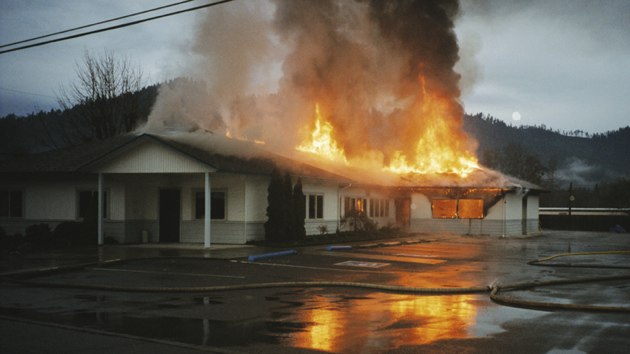Fair is Fair: Filmmaker Marshall Curry Refines the Lost Art of Objectivity
And anyway, to the extent this history is necessary, it is secondary to the ELF's ruins and the wife, family, victims, turncoats and investigators living among them. McGowan went from business major to radical almost overnight, from nonprofit do-gooder at sunrise to terror suspect by twilight. It's a full-on tragedy, ideology be damned.
"These fires were political, and there were tactical reasons that these people did them," Curry said. "But they were also emotional and part of a coming-of-age story. It's as much about that as it is about the environment. [...] That there could be people who were passionate about doing good who could go off the rails the way they did is a sad story. It's sad that friends turned on each other. It's sad that a guy who runs a timber company was afraid his house was going to get burned down because he cuts down trees. It's not a fun or happy story, and I felt that."
That cumulative power reflects Curry's greatest talent: From vérité campaign-trail flashes in Street Fight to intimate dinner-table powwows in Racing Dreams to the candid, point-blank interviews in_ If a Tree Falls_, his films take keen and unique advantage of both access and timing. It goes beyond being a fly on the wall, because if or when that fly leaves the wall, it's too often swatted away, unwelcome, by the subject or even the viewer. Curry's movies are more akin to the peace that follows swatting the fly -- people as they naturally are in relation to his stories, getting down to the business of communicating without distraction, discrimination or guile. At heart, the films seek to detail the spectrum of grace. Even a timber executive can be a sympathetic figure under these conditions.. Dare to compromise them -- or to swat, if we want to continue our metaphor -- and you wind up looking like Sharpe James, the scandal-plagued Newark mayor whom Curry filmed immolating under heat from the reform-minded Booker in 2002.
Of course, this knack isn't much use in the editing room, where If a Tree Falls finally emerged after a year and a half of more trial and error than even the customarily painstaking Curry is accustomed to. (The film eventually won the Best Documentary Editing prize at this year's Sundance Film Festival, where it premiered.)
"In the beginning, Daniel had always told us that he hadn't done it," he said. "I always imagined while we were shooting that the first act of the movie would be him saying that he didn't do it, and then you're kind of working your way through the clues that then reveal at the end of that first act that he had done it. But the truth was, once we started editing, was that that wasn't what was interesting. What's interesting was why he did it. Why did this kid -- who defies every stereotype you might have about eco-terrorism or terrorism in general -- commit these multi-million dollar arsons and face life in prison for it? How did that happen?"
And sorting that out required budget reinforcements, which, in a way, Curry's even-handed methodology made equally difficult to procure.
"I think the murkiness of the point of view was hard for people to get their brains around," he explained. "I feel like a lot of funders of documentaries today want to fund films that have a social message that is going to yield results. This film isn't that. If you love the environment, and you want to fund a movie about the environment and environmentalism, then this is not the movie that you're going to fund. If you love the timber industry, and you want to fund a movie about the timber industry, this is not the movie that you're going to fund. It has a point of view, but it's a very nuanced point of view. It's not polemical -- in a way that I think makes it a better movie, but it makes it harder to raise money from people who care about a cause and see documentaries as a way of furthering their cause."
Curry may yet find the activist route worth traveling, as many of his contemporaries have done to stirring, lucrative effect. There's little doubt he'd flourish in any storytelling context. Nevertheless, his films prove that humanity on its own terms has its own rewards. It just comes down to the eternal question with nonfiction: Will audiences take note? One can only hope that, for once, life and business may be as fair to Marshall Curry as he is to them.
Pages: 1 2


Comments
Nice piece. Marshall is a terrific filmmaker, and I hope this movie isn't as "criminally underseen" as Racing Dreams was.